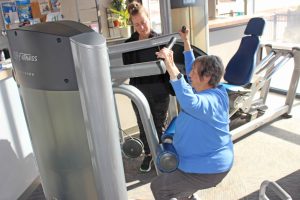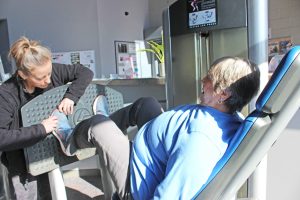Eileen Diggle doesn’t consider herself a fitness expert.
A retired math teacher, the 78-year-old is used to relying on her smarts more than her muscles. But three years ago, when her physical therapists told her she’d plateaued in her recovery from a surgery-related stroke, she turned to a personal trainer for help.
“So many times, I had reached the plateau,” Diggle said about her post-heart surgery and stroke-related physical therapy. “And it wasn’t very pleasant, because they kept telling me, ‘This is as good as you’re going to get.’”
Determined to regain her independence, Diggle reached out to Julie Fostin, a personal trainer at Total Fitness in Dartmouth, with whom she had worked years before in advance of knee replacement surgery. Together they put a plan together that Diggle could manage.
“I’ve always been independent and this completely tied me up at first,” Diggle said. “I literally couldn’t do anything. I couldn’t go to the bathroom by myself. I couldn’t go to bed by myself. It was awful.”
Older adults have many reasons for turning to the gym to stay healthy as they age, including surgeries, chronic conditions, reduced mobility, and more serious health concerns like Diggle’s. Making the decision to connect with a personal trainer is an individual one that can be especially helpful for anyone intimidated by a gym environment, worried about future injuries, or new to focused exercise routines.
A personal trainer will create a plan based on the individual’s goals, help them meet them safely, and offer encouragement and support along the way, said Fostin, who also directs the New Bedford Wellness Initiative.
At Total Fitness, Fostin works primarily with adults over age 50, many of whom come in with specific health concerns and needs.
“I am the patient trainer in the gym,” she said. “So my clients range from folks that have had multiple hip surgeries, knee replacements, back surgeries, Parkinson’s Disease.”
There is no age limit for working with a personal trainer, according to Fostin. She’s worked with individuals up to age 95, she said. One of her most dedicated clients is an 83-year-old retired physician who has had multiple shoulder surgeries.
“He’s by far the strongest male client I have. He’s like a rock star,” she said. “He knows his limitations but always pushes himself to the limit. He’s always willing do that extra repetition. Not everybody has that drive.”

“That’s how we started…it had to be three to four years ago. We’re now working on machines and she is walking with a cane and a walker,” Fostin said.
The two worked in a less active section of the gym to support Diggle’s use of the walker and help her go at her own pace. All of their efforts focused on improving Diggle’s quality of life.
“Physically, she works on the issues I have so that if I have a problem with something, she tries to find a way to help me with it,” Diggle said about their twice a week sessions.
Diggle said she’s not the perfect client. For example, she has taken the month of February off when the weather makes it hard to get to the gym. She measures her progress in inches, not feet; but even so, her longterm gains have been impressive.
In the time they’ve worked together, Diggle has regained her license and managed to drive to the gym on her own with her walker, including navigating stairs and heavy doors. It’s a big step up from having to ask her husband to bring her in the past. In fact, she proudly says she was able to drive her husband to his colonoscopy appointment when he needed transportation.
“Julie’s been a huge help,” she said. “And she encourages me too. Like every time I make a little progress, she’s like I need to cheer with you.”
Deb Fraine, an occupational therapist and certified hand therapist (for work with shoulders, elbows, wrists and hands) said Diggle’s experience is not unusual. Her clients usually get a very specific number of sessions with her before their insurance coverage ends. Fraine too recommends additional options like going to a gym, working with personal trainers individually or in a group setting, or taking yoga classes, when that happens.
She often hands off clients to personal trainers like Fostin, with whom she has worked in the past.
No matter what the challenge, modifications can always be made, Fraine said, even for those with very limited mobility. In those cases, exercises can be done seated or in bed.
Finding the right personal trainer is important and Fraine recommends shopping around for the best fit. Having an emotional connection with your trainer is important.
“For someone who has never exercised before, I’d have them interview their trainer,” Fraine said. (Ask), have they worked with people who have never exercised before, what experience level do they work with.”
Alternatively, Fraine said consider asking your doctor to make a referral to a physical therapist and start there.
The goal is to “keep every session interesting for them and make sure the client always has a successful experience,” she said. “As long as they have the right attitude, they will do it.”
Diggle clearly has the attitude needed.
“I’m kind of a tough old lady,” she said about her resolve. “I was always very independent. You wouldn’t know it now because I’m a big chicken all the time. But back in the day, I was the kind of person that would jump first and then be sorry later.”
The quality of life gains Diggle has achieved are a very big deal, Fostin said.
“We take for granted those things like showering on our own or going to the bathroom by ourselves or getting your license back and driving again,” she said. “I think that those are huge achievements. When you know what that’s like and then you don’t have it, and you’ve got to fight your way back to that and having the will to do that is pretty extraordinary.”

Recent Comments